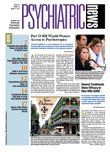A topical patch that delivers rivastigmine through the skin has been approved by the U.S. Food and Drug Administration (FDA) for the treatment of mild to moderate Alzheimer's disease and for treatment of mild to moderate dementia associated with Parkinson's disease. Rivastigmine, a reversible cholinesterase inhibitor, slows the breakdown of the neurotransmitter acetylcholine in the brain to prolong the cholinergic function. The patches will be available in the U.S. soon, according to Novartis, maker of the patch.
The FDA approval of rivastigmine transdermal system (Exelon Patch) is based on results from a randomized, double-blind, controlled clinical trial that compared the rivastigmine transdermal system with rivastigmine oral capsules and placebo. Nearly 1,200 patients with diagnosed Alzheimer's disease were given two doses of rivastigmine patches (9.5 mg/day or 17.4 mg/day), rivastigmine 6 mg oral capsule twice daily, or placebo for 24 weeks. The 9.5 mg/day patch resulted in similar efficacy as the 6 mg twice daily oral dose.
The oral formulations (capsules and solution) of rivastigmine tartrate have been marketed since 2000 and carry the same FDA-approved indications. The new transdermal formulation has the advantage of less fluctuation in absorption and plasma concentration, visual assurance of treatment compliance, and convenience for patients with difficulty swallowing—a symptom not unusual in Alzheimer's disease and Parkinson's disease.
Rivastigmine patches are supplied at two strengths, 4.6 mg and 9.5 mg, for once-daily dosing. For patients who are not on oral rivastigmine capsules or on a total daily dose of less than 6 mg, the recommended initial dose for the patch is one 4.6 mg patch a day, which may be increased to one 9.5 mg patch a day if the patient tolerates the lower dose for at least four weeks. Dose increase should be done with caution in patients with very low body weight because of elevated drug levels in the bloodstream. Patients who have been on oral doses 6 mg or more a day can be directly switched to the 9.5 mg patch. Rivastigmine patches should be applied once every 24 hours to a clean, dry, hairless, intact skin area, preferably on the upper or lower back to avoid being rubbed off or removed by the patient. The application sites should be rotated to minimize irritation.
Rivastigmine in the patch is absorbed through the skin. The plasma concentration peaks about eight hours after a patch is applied and then slowly declines.
Adverse reactions to rivastigmine patches are similar to those of the oral formulations. The most frequent reactions involve the gastrointestinal, cardiovascular, and neurological systems. In the clinical study, the most common adverse events included nausea, vomiting, diarrhea, depression, headache, anxiety, decreased appetite, and weight loss. Mild to moderate skin reaction to the patch application may occur. The drug is contraindicated in patients with hypersensitivity to rivastigmine, other carbamate derivatives, or any ingredient in the formulation.
Novartis announced on July 19 that the Committee for Medicinal Products for Human Use has recommended the approval of the rivastigmine transdermal system in the European Union for mild to moderate Alzheimer's disease.
FDA-approved rivastigmine transdermal system label information is posted at<www.fda.gov/cder/foi/label/2007/022083lbl.pdf>.▪
